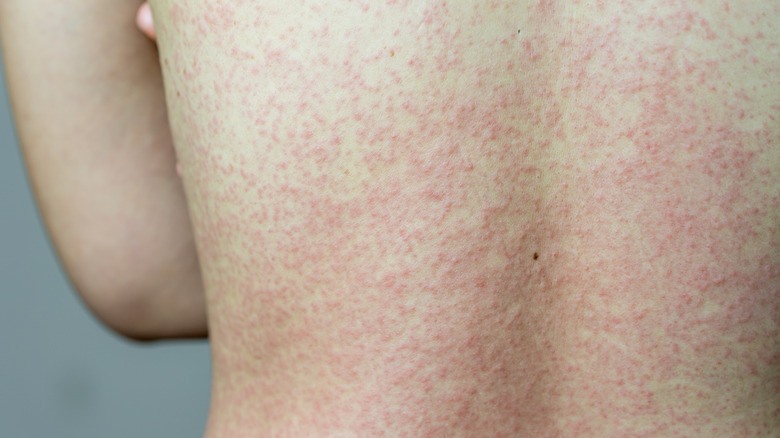What Happens To Your Body When You Have Shingles
You may have seen the commercial with older people doing active and healthy things while an announcer says the phrase, "Shingles doesn't care" (via YouTube). The catchphrase is for the SHINGRIX vaccine, and it has even turned into a meme. The surprising spot got a lot of attention, and if you've seen either the commercial or the meme, you might wonder what shingles even is, which was likely the goal of the ad campaign in the first place.
The Mayo Clinic reported that shingles is an illness caused by the chickenpox — or varicella-zoster — virus. If you had chickenpox earlier in your life, the virus lies dormant near your brain, and it can reoccur later in life as shingles. Typically, it isn't a life-threatening illness, but it is excruciating, making it something that most people want to avoid. In addition, it comes with the risk of a complication called postherpetic neuralgia, which makes the pain linger even after the rest of the infection seems to clear. Read on to find out what happens to your body when you experience a shingles outbreak.
Here's what shingles does to your body
Growing up, if you had chickenpox, you likely remember itchy red bumps that took a while to heal. When you get shingles later in life, it appears as painful, red bumps on your body, according to the Mayo Clinic. However, unlike the illness you remember from your childhood, it is usually concentrated on one part of your body instead of widespread. The bumps are painful, with a burning or tingling sensation occurring before they fully erupt from your skin on your torso (via WebMD). The itchy, fluid-filled blisters will likely burst and crust over a few days after they arise. Interestingly, you can have the illness and the pain without ever having the associated rash.
In addition to the likely painful rash, you might also experience a fever, fatigue, headache, and sensitivity to light. If you happen to experience the rash near your eye, it's essential to see your doctor to ensure it doesn't lead to eye damage. People over 60 also have an increased risk of complications and should see their doctor. Although not everyone who had chickenpox will get shingles, some people will, and if you have shingles, you can pass chickenpox on to people who aren't immune to the illness. If you want to avoid a severe shingles infection and you're age 50 or older, it's recommended to get a shingles vaccine to prevent yourself from getting it (via CDC).

